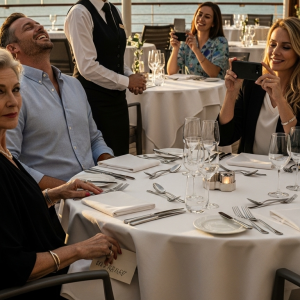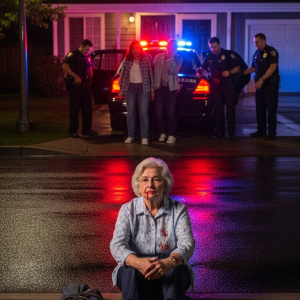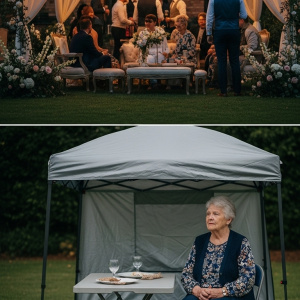My son and his wife threw me through a glass door. The glass shattered. I was bleeding. They called it an accident. I sat in that cold kitchen alone, thinking maybe I was truly worthless now that I had no paycheck. But what they never knew is that I had quietly inherited $21 million.
They believed I had nothing left. What will they do when they realize I could buy and sell their entire world with cash? I never expected to see my own blood on the kitchen floor. Not in my son’s house. Not at seventy-one.
It happened on a Tuesday. Snow had just started falling, soft and steady, like the hush before something breaks. Bradley and Juliana had been tense all morning. I made myself small, the way older women sometimes do when they sense their presence is a burden.
Juliana stood at the counter, arms crossed, her voice sharper than a shard of glass. “You’re still holding on to the deed, aren’t you, Clara?” Her tone sliced through the quiet air. I looked at her, then at my son. Bradley wouldn’t meet my eyes, just fiddled with his phone as if this conversation was beneath him. But it wasn’t. It involved all of us.
The house still had my name on it, and that was a problem for them. I knew they had been planning something—whispers after I went to bed, missing mail, locked drawers. I’d kept quiet, hoping I was wrong. I said calmly, “I’m not ready to sign anything. Perhaps we can talk after dinner.”
Juliana didn’t wait. She took two steps forward, her hand gripping my arm. “You’re being emotional. You just need some fresh air.” Bradley moved beside her, silent. I remember his hand brushing mine, the tightness in his jaw. The next second, I was falling.
My back hit the glass. There was a loud, dry crack, and then everything gave way. I landed outside, half in snow, half in shards of glass. The cold bit into my skin, the smell of my own blood mixing with the bitter scent of winter pine.
From inside, Juliana shouted that it was an accident, that I’d lost my balance. But they didn’t open the door. They didn’t come to check. Not even Bradley. I pulled myself to my feet, my coat torn, my hand bleeding freely. And yet, all I could feel was a profound stillness. Something inside me had finally snapped back into place.
I turned and walked away without a single word. They wanted me gone. In their eyes, I was no longer the mother who raised him. I was an obstacle, a signature on a piece of paper, a delay in their plans.
I didn’t go to the hospital. I went to the diner on Fourth and Maple, sat in the back booth, and ordered coffee. The waitress saw the blood, handed me a napkin, and said, “Take your time, hon.” And I did. That night, I booked a rental car and checked into a motel. They thought I was finished. But they forgot who built this life in the first place.
I stayed at the motel for three nights. It was the kind of place where the sheets were always cold and the ceiling fan ticked like a clock running out of time. It was quiet, and no one asked questions. I needed quiet more than comfort.
The morning after, I made a list with just one word at the top: Proof. I had spent decades reading people in boardrooms, but this was my son, my home. The lines had blurred until I couldn’t tell if I was living with family or with vultures waiting for me to leave.
I remembered the small camera I’d installed months ago, disguised as a ceramic owl on the bookshelf. I never thought I’d need it. I called Maya, an old colleague in tech security. Within hours, she recovered the footage and sent it to my private drive.
I watched it only once. Bradley’s hands. Juliana’s voice. The angle of the push, the sharp sound of the break, and then their silence. It wasn’t a misunderstanding. It was assault.
The next day, I called a lawyer. Her name was Nadine, a woman in her fifties with a voice like gravel and steel. She didn’t ask for drama; she asked for documentation. I gave her everything. While she drafted a case for elder abuse and property coercion, I began to move my other pieces into place.
I visited the bank, withdrawing enough to be mobile but not enough to raise flags. Most of my funds—the $21 million from a trust left by an old client—were untouched. Bradley assumed my retirement was a modest pension. That assumption was his greatest weakness.
I rented a short-term apartment under a different name. The first thing I placed on the counter was a folder. Inside was the footage, the house deed, and Nadine’s first draft of the complaint. Then I sat down and, for the first time in years, let myself feel everything. Beneath the ache, a quiet resolve began to bloom. Not to punish, but to reclaim.
I woke before sunrise, a new clarity settling over me. In the quiet of my new apartment, I opened the folder. The first document was the house deed, my name clear as day. The second was a ledger of my financial holdings. The third was a still frame from the security footage: my hands in the air, the moment before the fall.
I pulled out an old notebook, its green cloth cover worn soft. I had jotted down things for years—conversations, dates, small moments that felt wrong. The mail being sorted before I saw it. Bradley insisting on managing the utility bills. Juliana’s casual, calculated questions about my will.
I remembered asking for my Medicare card. “I put it somewhere safe,” Juliana had waved me off. I never found it. They weren’t waiting for me to die. They were preparing for me to disappear.
At 10:00 a.m., I walked into Nadine’s office. She reviewed the folder, her expression unreadable. “We have a case,” she confirmed, her voice firm. “Not just for assault, but for financial manipulation, coercion, and willful neglect.”
I asked her to keep everything sealed for now. I wasn’t looking for headlines; I wanted resolution. By noon, I had signed the preliminary affidavit. By sundown, the motion had begun. And once something like this starts rolling, it cannot be undone.
That night, I updated my trust, removing all heirs until further notice. I shielded the house title in a new revocable trust. The woman they tried to erase had already written the next chapter without them. It would be weeks before they noticed anything, but the silence I left behind would grow louder every day.
Three days later, Nadine called. The complaint was officially filed. That afternoon, I mailed a pre-sealed envelope to Bradley and Juliana. Inside was a copy of the complaint and a notice of restricted contact, effective immediately.
The next morning, Nadine emailed a case update. The court had issued a preliminary review date. If things continued, the footage would be used as direct evidence, and a temporary restraining order could be placed. It was a small step, but it was alignment.
That week, I met with Marcus, my estate planner. I told him to prepare documents to move the bulk of my holdings into a new foundation. It would be a nonprofit trust to support career retraining for women over sixty—women who had given everything to family, only to find themselves discarded.
A few days later, I received a voicemail from Juliana. Her voice was tight, practiced. “Clara, we received your lawyer’s letter. We were… surprised by the accusations. I hope we can resolve this privately.” No apology. Just damage control.
I didn’t respond. Nadine would handle all contact. Instead, I went for a walk. The wind was sharp, but I didn’t flinch. They thought pushing me through glass would break me. What they didn’t realize was that some glass shatters, but the woman on the other side can come out sharper. I now had precision, paperwork, and patience.
The first time I saw Juliana again, it wasn’t in a courtroom. It was at a property showcase for newly renovated homes. One of the homes had been funded by a private investment group. What Juliana didn’t know was that the group had recently come under new management: me.
I walked the house like any other guest, listening to her polished voice explain the imported tile and solar panels. When she finally turned and saw me, her professional smile faltered for just a second before snapping back into place.
I walked into the master bedroom. Her assistant, Chloe, followed me. “Excuse me,” she said, her tone arrogant. “This is a private showing.” I turned and handed her a business card. My name was listed under Strategic Partner.
Her eyes widened. She stammered something about checking with Juliana. “Take your time,” I said softly. “I’ll be in the sunroom.” Ten minutes later, Juliana appeared, her eyes cold and calculating. She knew this wasn’t a coincidence.
“Have you reviewed the latest sponsorship ledger, Juliana?” I asked, my voice even. The company she worked for had taken a bridge loan from silent backers for this renovation. By assuming management of the fund, I had become her silent partner.
I didn’t wait for a response. I just told her, “Everything leaves a paper trail,” and walked out. The point wasn’t confrontation. It was to remind her that she had underestimated the wrong woman.
That same week, Nadine informed me the court investigation had moved from preliminary review to active motion. The trust paperwork for the Montrose Initiative was finalized, with the first $5 million transferred. The ground beneath their feet had begun to shift, and I was no longer standing still.
The courtroom was cold and smelled of old paper. I arrived early, dressed in navy slacks and my late husband’s watch. Nadine was already there, her calm presence a fortress. Across the aisle, Bradley sat stiffly beside his attorney, unable to meet my gaze. Juliana entered last, sitting alone in the row behind him.
The judge, a woman in her sixties with steel-gray hair, began. The clerk read the charges: misdemeanor elder abuse, obstruction of reporting, and attempted coercion. The words hung in the silent room.
Then, Nadine presented the footage on a large monitor. No sound, just the video. Bradley’s arm. My body staggering back. The glass shattering. The courtroom was utterly still. Even the judge sat motionless for a long moment before making a note.
Bradley’s attorney spoke of “misunderstandings” and “family arguments.” He painted a picture of a son pushed too far. When Juliana was asked to make a statement, she shook her head. Her silence was the loudest confession she could have made.
The judge ruled quickly. The case would proceed to a full review. The protective order was extended. Bradley and Juliana’s financial access was frozen, their shared accounts placed under audit. When the gavel came down, I stood, nodded to Nadine, and walked out without looking back.
That evening, a handwritten letter from Bradley was waiting. He said he was sorry, that he’d been under pressure. He asked me to remember the boy he used to be. I read it once, then placed it in a drawer. Forgiveness is a process, not a performance.
The final audits came back. Every attempt Bradley and Juliana had made to touch my assets had failed, all documented and traceable. The house was restored to my name, the deed corrected, the will updated. My foundation, the Montrose Initiative, had gained its nonprofit status.
One afternoon, I sat in on a community roundtable hosted by the foundation. A woman named Felicia, 65 and recently divorced, sat beside me. “I used to think becoming invisible was just part of aging,” she said, her voice quiet. “Then maybe it’s time we rewrite what strength looks like,” I replied.
A week later, Nadine called with the final judgment. Bradley was placed under a restricted financial order for five years and required to attend counseling for abusive behavior. Juliana had settled, relinquishing all claims. There would be no trial. It was over. Not with a bang, but with the quiet finality of a signature on a page.
I drove to my old house one last time. A new couple lived there now. They had replaced the glass door, but I could still see the faint mark where the original had splintered. I didn’t need to reclaim the building; I had already reclaimed my life.
I now spend my days at the foundation, surrounded by women finding their second wind. The work is quiet, but it is real. The other night, I sat by my window, watching the snow fall, and wrote one final line in my notebook: Justice isn’t always loud, but when it’s real, it doesn’t need to be. And for the first time in years, I felt a profound and unshakable peace.




